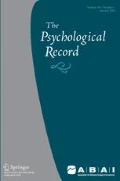Abstract
Recent empirical studies have emerged within the acceptance and commitment therapy (ACT) literature that demonstrate the utility for considering relational frame theory when designing and developing therapeutic interventions. The current study investigated distinction and hierarchical relations when targeted specifically in a self as context exercise. Participants were also exposed to a practice interval placed between two presentations of a distress-induction task, to determine potentially lasting impacts of the interventions. A second aspect of the research examined the extent to which a focus on the self (as opposed to focusing on a hypothetical object) played a role in the outcomes. We hypothesized that the self-based hierarchical relations intervention would be the most effective in terms of distress reduction (e.g., discomfort). This prediction was somewhat supported as statistical analysis demonstrated that both hierarchical conditions (self and object) showed superiority in terms of stress reduction compared to both distinction conditions. These results are discussed with regard to previous translational research between RFT and ACT.




Similar content being viewed by others
References
Bond, F. W., Hayes, S. C., Baer, R. A., Carpenter, K. C., Guenole, N., Orcutt, H. K., … Zettle, R. D. (2011). Preliminary psychometric properties of the Acceptance and Action Questionnaire-II: A revised measure of psychological flexibility and acceptance. Behavior Therapy, 42(4), 676–688.
Foody, M., Barnes-Holmes, Y., & Barnes-Holmes, D. (2012). The role of self in Acceptance and Commitment Therapy (ACT). In L. McHugh & I. Stewart (Eds.), The self and perspective taking: Research and applications (pp. 125–142). Oakland, CA: New Harbinger.
Foody, M., Barnes-Holmes, Y., Barnes-Holmes, D., & Luciano, C. (2013). An empirical investigation of hierarchical versus distinction relations in a self-based ACT exercise. International Journal of Psychology and Psychological Therapy, 13, 373–385.
Gil, E., Luciano, C., Ruiz, F. J., & Valdivia-Salas, V. (2012). A preliminary demonstration of transformation of functions through hierarchical relations. International Journal of Psychology and Psychological Therapy, 12(1), 1–19.
Griffee, K., & Dougher, M. J. (2002). Contextual control of stimulus generalization and stimulus equivalence in hierarchical categorization. Journal of the Experimental Analysis of Behavior, 78, 433–447.
Gutierrez, O., Luciano, C., Rodriguez, M., & Fink, B. C. (2004). Comparison between an acceptance-based and a cognitive-control-based protocol for coping with pain. Behavior Therapy, 35, 767–784.
Hayes, S. C. (1984). Making sense of spirituality. Behaviorism, 12, 99–110.
Hayes, S. C., Barnes-Holmes, D., & Roche, B. (Eds.). (2001). Relational Frame Theory: A post-Skinnerian account of human language and cognition. New York, NY: Plenum Press.
Hayes, S. C., Barnes-Holmes, D., & Wilson, K. G. (2012). Contextual Behavioral Science: Creating a science more adequate to the challenge of the human condition. Journal of Contextual Behavioral Science, 1, 1–16.
Hayes, S. C., Strosahl, K., & Wilson, K. G. (1999). Acceptance and commitment therapy: An experiential approach to behavior change. New York, NY: Guilford Press.
Hayes, S. C., Wilson, K. W., Gifford, E. V., Follette, V. M., & Strosahl, K. (1996). Experiential avoidance and behavioral disorders: A functional dimensional approach to diagnosis and treatment. Journal of Consulting and Clinical Psychology, 64, 1152–1168.
Kehoe, A., Barnes-Holmes, Y., Barnes-Holmes, D., Luciano, C., Bond, F., & Foody, M. (2014). Systematic analysis of the effects of acceptance on tolerance of radiant heat pain. The Psychological Record, 64, 41–51.
Luciano, C., Ruiz, F. J., Vizcaíno Torres, R. M., Sánchez Martín, V., Gutiérrez Martínez, O., & López López, J. C. (2011). A relational frame analysis of defusion in acceptance and commitment therapy: A preliminary and quasi-experimental study with at-risk adolescents. International Journal of Psychology and Psychological Therapy, 11(2), 165–182.
Masuda, A., Hayes, S. C., Sackett, C. F., & Twohig, M. P. (2004). Cognitive defusion and self-relevant negative thoughts: Examining the impact of a ninety year old technique. Behaviour Research and Therapy, 42, 477–485.
Roche, B., & Barnes, D. (1996). Arbitrarily applicable relational responding and human sexual categorization: A critical test of the derived difference relation. The Psychological Record, 46, 451–475.
Slattery, B., Stewart, I., & O’Hora, D. (2011). Testing for transitive class containment as a feature of hierarchical classification. Journal of the Experimental Analysis of Behavior, 96, 243–260.
Steele, D. L., & Hayes, S. C. (1991). Stimulus equivalence and arbitrarily applicable relational responding. Journal of the Experimental Analysis of Behavior, 56, 519–555.
Acknowledgments
The authors would like to extend a special thanks to Ben Reinhardt, Emma Delemere, and Seamus Farrell, who helped with data collection for the current article.
Author information
Authors and Affiliations
Corresponding author
Rights and permissions
About this article
Cite this article
Foody, M., Barnes-Holmes, Y., Barnes-Holmes, D. et al. An Empirical Investigation of the Role of Self, Hierarchy, and Distinction in a Common Act Exercise. Psychol Rec 65, 231–243 (2015). https://doi.org/10.1007/s40732-014-0103-2
Published:
Issue Date:
DOI: https://doi.org/10.1007/s40732-014-0103-2




